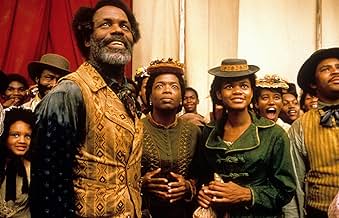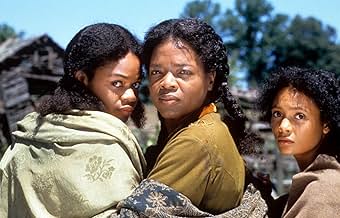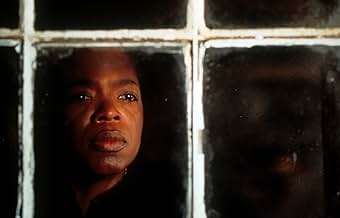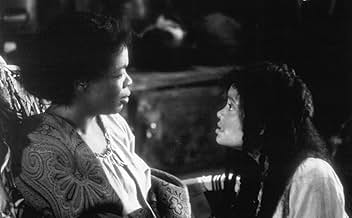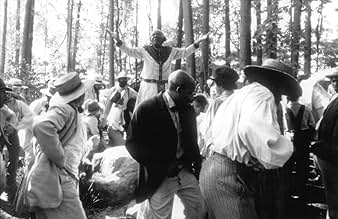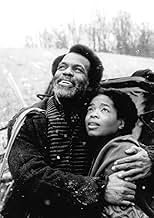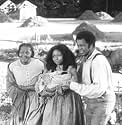AVALIAÇÃO DA IMDb
6,1/10
9,8 mil
SUA AVALIAÇÃO
Baseado no livro de Toni Morrison, no qual um escravo é visitado pelo espírito de uma jovem misteriosa.Baseado no livro de Toni Morrison, no qual um escravo é visitado pelo espírito de uma jovem misteriosa.Baseado no livro de Toni Morrison, no qual um escravo é visitado pelo espírito de uma jovem misteriosa.
- Direção
- Roteiristas
- Artistas
- Indicado a 1 Oscar
- 3 vitórias e 24 indicações no total
Kessia Embry
- Amy Denver
- (as Kessia Kordelle)
LisaGay Hamilton
- Younger Sethe
- (as Lisa Gay Hamilton)
Thandiwe Newton
- Beloved
- (as Thandie Newton)
Avaliações em destaque
Beloved the movie seeks to rival Beloved the novel in telling the African-American story. While it could not attempt to capture all of the richness of Morrison's great novel, it does do what it can in the constraints of a feature movie. The performances are phenomenal, and any Oscar nominations will be well deserved. The Ohio/Kentucky background takes one's breath away and the movie really does grip its viewer during key scenes
However, Morrison's non-linear style did not translate as well on the big screen and the flashbacks are truly confusing at points. Moreover, the movie has about three natural climaxes which heighten the viewer's awareness of the length of the movie.
All told, it is a good movie, but it is not a must-see movie, nor will it have the cultural impact Oprah intended.
(As for no likeable white characters which some posts have charged, first Mr. Baldwin is a likeable white person. Second, in a post-slavery society of Ohio/Kentucky, why do there have to be any good whites in this narrow world? Oh yeah, don't be mad at Oprah for that--Morrison didn't include any in her book either)
However, Morrison's non-linear style did not translate as well on the big screen and the flashbacks are truly confusing at points. Moreover, the movie has about three natural climaxes which heighten the viewer's awareness of the length of the movie.
All told, it is a good movie, but it is not a must-see movie, nor will it have the cultural impact Oprah intended.
(As for no likeable white characters which some posts have charged, first Mr. Baldwin is a likeable white person. Second, in a post-slavery society of Ohio/Kentucky, why do there have to be any good whites in this narrow world? Oh yeah, don't be mad at Oprah for that--Morrison didn't include any in her book either)
READ THE BOOK, PEOPLE, READ THE BOOK! The book helped me understand the film and the film helped me understand the book. This is an amazing piece of work. Winfrey gives a moving and observant performance and Thandie Newton is startling. Some scenes are intense, making you think whether you would kill your child. I didn't notice any gliches and I think the film screams for Oscars. I think this whole slave movie thing going on is getting boring but when they are made with such power and great directing and acting, I praise God for it! Demme gives us one of the most touching ghost stories and certainly the strangest, in a while.
I read Beloved in an intro English course and it took me a long while to get used to Toni Morrison's writing style. She once said in an interview that she wrote the book to be disorienting, in some ways to re-enact the feeling of the slave diaspora.
I thought the book heart-wrenching, at times gut-wrenching, and vivid. The character of Paul D never made much sense, seeming like a man waiting for something to happen, but Sethe burned off the page. What I remember most is Baby Suggs' speech at the rock, which the film has divided into three segments.
I projected Beloved for the college theater and I have to say it was long and arduous, especially if you haven't read the novel. There is no SENSE to the PAIN that goes on with these characters; in Braveheart and Titanic, we have a certain tragic pleasure in mass death or torture that we can't receive from Beloved. I read a lot of comments talking about the ghost in Beloved, but the ghost is more of a catalyst for looking into the characters than the star of the film.
I admired the time put in most. It just seemed like Demme and Tak Fujimoto, and the lighting designer as well, gave the actors the time they needed to act and sink into things: unlike traditional MTV-editing, some scenes were comprised of only one shot, usually tracking, as Paul D and Sethe in the cornfield. The score was brilliant; Portman really found a grace in stillness and the trembling African voice and the flute. It was bare but riveting at the same time.
People have said that the film went for too much shock value. That's possible- did we need the close-up of the dead child at the breast? No. But then again when we read it in the book, don't we think of it? Don't we for a split second see that image in our heads? I for one thought of much more graphic things when Morrison discussed Paul D and Beloved's night in the shed. The camera and the actors treat the world of Beloved and the audience with respect. Winfrey does seem more like someone who loves Sethe's character, than Sethe herself, but she did it for me. The sadness, the strength, emptiness, she did it, and Lisa Gay Hamilton as the young Sethe was riveting with her time in the film. The look in her eyes when Schoolteacher says "Animal" is amazing.
Danny Glover always does a good job, but he didn't really amaze me. For me, you know what you're getting with Glover, nice guy, troubled soul, easy-going with fits of rage every now and then. It's what he likes to play, and he does it well here but no surprises. The surprises are Winfrey, and Kimberly Elise especially in those crucial minutes when she decides to leave home, the fear and determination on her face. (She somehow becomes more sexual by the end of the film when she sees Paul D.) Thandie Newton is incredibly freaky and disgusting as Beloved with the exception of that ONE long gaze she gives Danny Glover that night, seduction, perfect symmetry. And Beah Richards as Baby Suggs: I wanted her to be my mother. She broke my heart with her religion: "This is the prize. This is the prize." The preaching scenes are INCREDIBLE in this film, especially since Tak Fujimoto chooses a circular tracking shot that allows them to do it all at once.
There isn't much redemption at the end. Sethe is drained and miserable. Paul D is on his own but still not totally free. I think Roger Ebert's comment put it best: the happy ending of Beloved is that the ordeal is OVER. There is no sense to the pain, but one hopes at the end that there can be healing.
I loved this film. I loved the fact that it's not hammering any one message home, but you can take things about motherhood, race, brutality, the dangers of love and commitment, freedom, and chains out with you: it's all there. And it is as beautiful as it is wrenching.
I thought the book heart-wrenching, at times gut-wrenching, and vivid. The character of Paul D never made much sense, seeming like a man waiting for something to happen, but Sethe burned off the page. What I remember most is Baby Suggs' speech at the rock, which the film has divided into three segments.
I projected Beloved for the college theater and I have to say it was long and arduous, especially if you haven't read the novel. There is no SENSE to the PAIN that goes on with these characters; in Braveheart and Titanic, we have a certain tragic pleasure in mass death or torture that we can't receive from Beloved. I read a lot of comments talking about the ghost in Beloved, but the ghost is more of a catalyst for looking into the characters than the star of the film.
I admired the time put in most. It just seemed like Demme and Tak Fujimoto, and the lighting designer as well, gave the actors the time they needed to act and sink into things: unlike traditional MTV-editing, some scenes were comprised of only one shot, usually tracking, as Paul D and Sethe in the cornfield. The score was brilliant; Portman really found a grace in stillness and the trembling African voice and the flute. It was bare but riveting at the same time.
People have said that the film went for too much shock value. That's possible- did we need the close-up of the dead child at the breast? No. But then again when we read it in the book, don't we think of it? Don't we for a split second see that image in our heads? I for one thought of much more graphic things when Morrison discussed Paul D and Beloved's night in the shed. The camera and the actors treat the world of Beloved and the audience with respect. Winfrey does seem more like someone who loves Sethe's character, than Sethe herself, but she did it for me. The sadness, the strength, emptiness, she did it, and Lisa Gay Hamilton as the young Sethe was riveting with her time in the film. The look in her eyes when Schoolteacher says "Animal" is amazing.
Danny Glover always does a good job, but he didn't really amaze me. For me, you know what you're getting with Glover, nice guy, troubled soul, easy-going with fits of rage every now and then. It's what he likes to play, and he does it well here but no surprises. The surprises are Winfrey, and Kimberly Elise especially in those crucial minutes when she decides to leave home, the fear and determination on her face. (She somehow becomes more sexual by the end of the film when she sees Paul D.) Thandie Newton is incredibly freaky and disgusting as Beloved with the exception of that ONE long gaze she gives Danny Glover that night, seduction, perfect symmetry. And Beah Richards as Baby Suggs: I wanted her to be my mother. She broke my heart with her religion: "This is the prize. This is the prize." The preaching scenes are INCREDIBLE in this film, especially since Tak Fujimoto chooses a circular tracking shot that allows them to do it all at once.
There isn't much redemption at the end. Sethe is drained and miserable. Paul D is on his own but still not totally free. I think Roger Ebert's comment put it best: the happy ending of Beloved is that the ordeal is OVER. There is no sense to the pain, but one hopes at the end that there can be healing.
I loved this film. I loved the fact that it's not hammering any one message home, but you can take things about motherhood, race, brutality, the dangers of love and commitment, freedom, and chains out with you: it's all there. And it is as beautiful as it is wrenching.
Is the only word that I can describe how I felt--directly after viewing the film and for several days afterwards. I was disturbed by the comments from people who don't have any feeling for what the film is saying or from people who don't grasp what is the result from slavery, guilt, survival and how to go one. Those who say the film is too long --that is how slavery was it went on for too long, and still goes on. Comments about the quality of the film the flow of the film. People seldom think in chronological order--feelings, taste, smells return in bursts . I have not experienced slavery(although I am African American) but only the results of slavery - mentally, emotionally, physically, socially, and economically--The film starts out with the reunion of Sethe and Paul D-(who both did time(as in prison) on Sweet Home)--the haunting of the home that Sethe occupies with her daughter Denver--this is similar to haunting women experience when they have had an abortion --you never get over it and even though I understood Sethe's need to destroy her children rather than have them experience slavery I just could not do it--I would rather inflict something on myself to prevent the ability to have any more children. But it is the same people that with courage and hope that is responsible for my life today. People(those with the negative comments) should stick to movies such as Austin Powers--they are uncomfortable with movies that invoke any thought, or feeling.
Famous feminist writer, Toni Morrison, deserved to win a Pulitzer Prize for her historical novel that represents Black American's struggles with slavery and freedom.
How anyone, let alone hundreds of voters here, could rate this marvelously directed & performed film a 1 is beyond me. Oprah Winfrey is the leading lady of the cast who ultimately demonstrates what is an Oscar-entitled performance.
Sethe, the character Winfrey plays is one of the most complex & challenging ones that I can imagine for any actor to take upon themselves. In fact, Winfrey stayed so true to her character, in my mind, she became Sethe: a former slave mother, a million & a half miles away from a Oprah the billionaire guest show host in Chicago! Danny Glover also gave a grand performance that was equally far from any other role I've seen him play. He & Winfrey together are a fine big screen match who I hope are in movies with Pulitzer prize winning plots as thick as is this one.
How anyone, let alone hundreds of voters here, could rate this marvelously directed & performed film a 1 is beyond me. Oprah Winfrey is the leading lady of the cast who ultimately demonstrates what is an Oscar-entitled performance.
Sethe, the character Winfrey plays is one of the most complex & challenging ones that I can imagine for any actor to take upon themselves. In fact, Winfrey stayed so true to her character, in my mind, she became Sethe: a former slave mother, a million & a half miles away from a Oprah the billionaire guest show host in Chicago! Danny Glover also gave a grand performance that was equally far from any other role I've seen him play. He & Winfrey together are a fine big screen match who I hope are in movies with Pulitzer prize winning plots as thick as is this one.
Você sabia?
- CuriosidadesThandiwe Newton's African first name means, interestingly enough, "beloved."
- Erros de gravaçãoIn the scene with a deer in the field, a car is visible driving by in the upper right hand corner.
- Citações
Baby Suggs: And the beat, beat, of your heart... Love it. More than the lungs that need yet to breathe free air. More than the womb, which holds life. More than the private parts that give life. Love your heart. This... this is the prize. Amen. This the prize... Amen!
- Cenas durante ou pós-créditosIn lieu of traditional opening credits, the movie begins with the camera moving through a cemetery to focus on a gravestone engraved with the sole word "BELOVED".
- Versões alternativasIn the version aired on television there is a deleted scene and two alternate scenes. The TV version also removes any mention of Sethe's sons. They don't exist in the TV version. The first alternate scene is when Paul D is telling Sethe about Halle being in the loft. In the theatrical you see Paul D quoting Halle. In the TV version there is a flashback to Halle (Hill Harper) saying "The loft." The second alternate scene in the prayer group discussing how to deal with Sethe being haunted by Beloved. In the theatrical there is a line about Sethe being like batter. In the Tv version that is removed and there is a line inserted from another woman saying "I don't mind a little communication between worlds but this is invasion" and another character says "we better get to work and pray" The deleted scene added for the TV version has Stamp Paid asking Paul D if beloved is his problem and not what Sethe did.
Principais escolhas
Faça login para avaliar e ver a lista de recomendações personalizadas
Detalhes
Bilheteria
- Orçamento
- US$ 80.000.000 (estimativa)
- Faturamento bruto nos EUA e Canadá
- US$ 22.852.487
- Fim de semana de estreia nos EUA e Canadá
- US$ 8.165.551
- 18 de out. de 1998
- Faturamento bruto mundial
- US$ 22.852.487
- Tempo de duração2 horas 52 minutos
- Cor
- Mixagem de som
- Proporção
- 1.85 : 1
Contribua para esta página
Sugerir uma alteração ou adicionar conteúdo ausente



